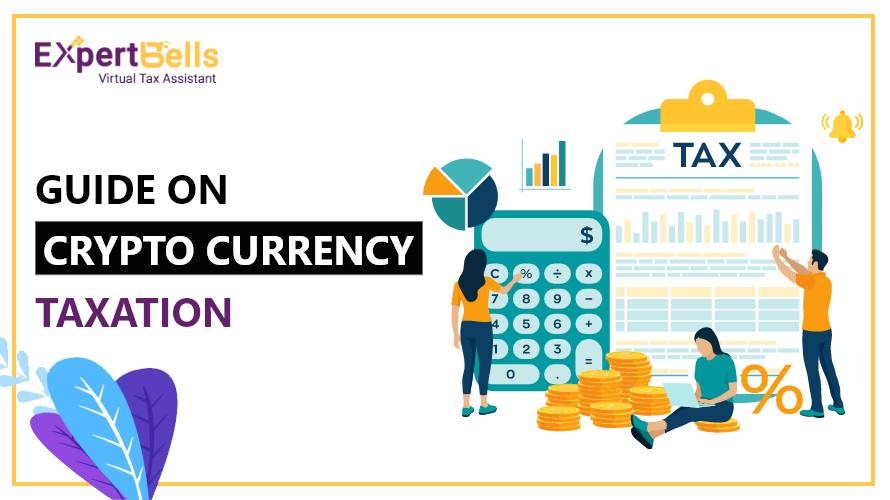Guide on Cryptocurrency Taxation

Background of Crypto and Recent Developments:
You must have heard about cryptocurrency somewhere. It is a kind of digital or virtual currency secured by cryptography. It is impossible to create a duplicate of the same. It is based on block chain technology. It is not issued by any government or central authority but based on network distributed across a large network of computers.
Cryptocurrency can be either mined by oneself or purchased from cryptocurrency exchanges. Some common crypto currencies are Bitcoin, Ethereum, dogecoin, USDT, XRP. Bitcoin is the most widely traded cryptocurrency and is valued at around 41% of total cryptocurrency value.
Cryptocurrency as of now has no legal existence. But also, it is not legally banned in India. There is no law which bans the trading of cryptocurrencies.
It has been in news that the Government will introduce ‘The Cryptocurrency and Regulation of Official Digital Currency Bill 2021’ in Parliament during the ongoing Winter Session.
The bill is intended to prohibit all the private cryptocurrencies in India. But it will also focus on the underlying technology behind crypto and promotion of its uses for creation of official cryptocurrency which can be issued by the reserve bank of India.
The government before introducing the crypto bill wants to take feedbacks from certain crypto exchanges, council, international bodies so that the bill can be in line with international standards. Below we mentioned Cryptocurrency Taxation Guide that helps you to understand cryptocurrency taxation more clearly.
Taxation aspect of Cryptocurrency Transactions: Income Tax on Crypto Gains
As per income tax act, 1961, there is currently no specific provisions there to define the taxability of cryptocurrency.
People all around the world are taking interest in investing and trading in crypto currency. But very less are aware of the tax compliance of the same.
Even if the cryptocurrencies are not a legal tender here in India but that does not mean you don’t need to pay any tax on the income earned from transacting in the same.
As Per Section 2(24) of Income Tax Act, 1961:
The definition of term ‘Income’ as does not explain what income is? It only tells that the above-mentioned receipts are also included in the meaning of term income. The definition given u/s 2(24) is inclusive and not exhaustive.
According to english dictionary, the term income means “periodical receipts from one‘s business, land, work, investments etc.”
The term income simply means something which comes in. It is a periodical return with regularity or expected regularity. It’s nowhere mentioned that income refers to only monetary return. It includes value of benefits and perquisites. Anything which can reasonably and properly be described as income is taxable under this Act unless specifically exempted under the various provisions of this Act.
In India, many people have doubt about legality of the crypto but the Income Tax act does not differentiate the charging of tax on the basis of legality of the income.
Once Mr. Anurag Singh Thakur, Ministry of finance said in response to a question in the Rajya Sabha that ‘the gains resulting from the transfer of cryptocurrencies are subject to tax under the head of income, depending upon the nature of holding of the same’.
Nature of Cryptocurrency Can be of following:
- For trading on frequent basis
- For Investment – short or long-term period
- Mining/generation of cryptocurrency
Taxability on the Basis of Nature of Cryptocurrency:
-
Trading on Frequent Basis:
If you are trading in cryptocurrency on frequent basis. It can be considered as your business income. Cryptocurrency you are holding will be considered as a stock in trade. You can claim the expenses related to your crypto trading from the profits made.
Tax will be charged as per normal slab if you are an individual and 30% in case you are a company.
-
Investment – Short or Long-Term Period
If you are holding any cryptocurrency as an investment either for short or long period of time. It should be treated under the head capital gain.
If you are holding it for more than 36 months, long term capital gain tax will be applicable at the time of sale and you should be paying tax @ 20% after indexation benefit.
If you are holding it for less than 36 months, the short term capital gain should be added to your normal income and will be taxable as per the tax slab applicable to you.
Capital gain = selling price – buying price – fees
-
Mining/Generation of Cryptocurrency:
Mining of crypto currency can be considered as a business activity since the miners are in the business of manufacturing a cryptocurrency by using the computers, power and human resources. Profit can be arrived by reducing the cost of mining from the sale proceeds of the generated cryptocurrencies.
So, even if there are no specific provisions for taxation of cryptocurrencies, but based on general definition of Income as stated in the Income Tax act and purpose and intent of law, tax on crypto profit needs to be paid by the assesses based on the nature of holding of cryptocurrencies by them.
We can expect that once the crypto bill is passed, the income tax will also include specific provisions regarding the taxability of cryptocurrencies. Till then by using the general provisions, we can pay the tax on crypto gains so that we do not face any non-compliance for no-reporting or under-reporting of our total income.
For any expert assistance on crypto related tax queries and filing of return-s, you can contact us at (+91) 7438-99-7438 or email us at expertbellsconsulting@gmail.com. Our team of professional’s experts will be happy to assist you on crypto currency taxation.
Related Articles
Leave A Reply
Your email address will not be published. Required fields are marked *
Most Popular Blogs


What is a Mentor? Definition, Purpose & More

Difference Between Mentor and Mentee

How To Find A Business Mentor: A Complete Guide






5 Comments
Lorem Ipsum is simply dummy text of the printing and typesetting industry. Lorem Ipsum has been the industry's standard dummy text ever since the 1500s, when an unknown printer took a galley of type and scrambled it to make a type specimen book. It has survived not only five centuries, but also the leap into electronic typesetting, remaining essentially unchanged. It was popularised in the 1960s with the release of Letraset sheets containing Lorem Ipsum passages, and more recently with desktop publishing software like Aldus PageMaker including versions of Lorem Ipsum.
Lorem Ipsum is simply dummy text of the printing and typesetting industry. Lorem Ipsum has been the industry's standard dummy text ever since the 1500s, when an unknown printer took a galley of type and scrambled it to make a type specimen book. It has survived not only five centuries, but also the leap into electronic typesetting, remaining essentially unchanged. It was popularised in the 1960s with the release of Letraset sheets containing Lorem Ipsum passages, and more recently with desktop publishing software like Aldus PageMaker including versions of Lorem Ipsum.
Lorem Ipsum is simply dummy text of the printing and typesetting industry. Lorem Ipsum has been the industry's standard dummy text ever since the 1500s, when an unknown printer took a galley of type and scrambled it to make a type specimen book. It has survived not only five centuries, but also the leap into electronic typesetting, remaining essentially unchanged. It was popularised in the 1960s with the release of Letraset sheets containing Lorem Ipsum passages, and more recently with desktop publishing software like Aldus PageMaker including versions of Lorem Ipsum.